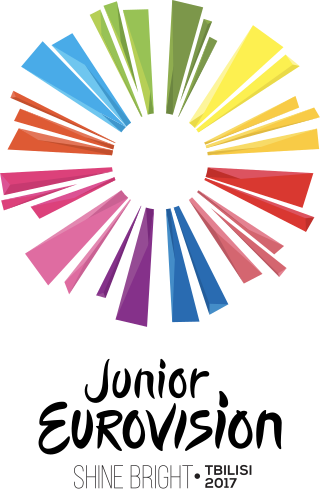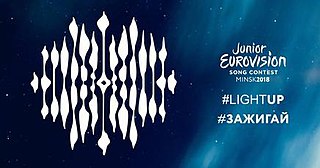
The United Kingdom first participated in the Junior Eurovision Song Contest at the inaugural 2003 edition which took place in Copenhagen, Denmark. ITV, a member organisation of the United Kingdom Independent Broadcasting (UKIB) and the European Broadcasting Union (EBU), was responsible for the selection process of their participation from 2003 to 2005. The United Kingdom used a national selection format, broadcasting a show entitled Junior Eurovision Song Contest: The British Final, for their participation at the contests. The first representative to participate for the nation at the 2003 contest was Tom Morley with the song "My Song For The World", which finished in third place out of sixteen participating entries, achieving a score of one hundred and eighteen points. The United Kingdom withdrew from competing after the 2005 contest, but returned to the contest in 2022 in Yerevan, Armenia, with the British Broadcasting Corporation (BBC) replacing ITV as the country's broadcaster. The country withdrew again from the 2024 contest in Madrid.

The Netherlands has participated in every edition of the Junior Eurovision Song Contest since its inception in 2003 and is the only country to have taken part in every edition of the contest. The country has won the competition on one occasion; in 2009, with the song "Click Clack" by Ralf Mackenbach. Dutch broadcaster AVROTROS has been responsible for the participation, selecting the nation's entrant through the national final Junior Songfestival.

The participation of Spain in the Junior Eurovision Song Contest first began at the inaugural Junior Eurovision Song Contest in 2003 which took place in Copenhagen, Denmark. The current Spanish participant broadcaster in the contest is Radiotelevisión Española (RTVE). Spain used a national selection format, broadcasting a show entitled Eurojunior, for their participation at the contests. The first representative to participate for the nation at the 2003 contest was Sergio with the song "Desde el cielo", which finished in second place out of sixteen participating entries, achieving a score of 125 points. Spain did not participate from 2007 to 2018, but returned to the contest in 2019.

Belarus has participated in the Junior Eurovision Song Contest in every edition since its inception in 2003 until 2020. The Belarusian Television and Radio Company (BTRC), then a member organisation of the European Broadcasting Union (EBU), has been responsible for the selection process of its participants since its debut. The country hosted the contest at the Minsk-Arena in 2010 and again in 2018.

Portugal has participated in the Eurovision Song Contest 55 times since its debut at the 1964 contest. Since then it has missed five contests. The current Portuguese participant broadcaster in the contest is Rádio e Televisão de Portugal (RTP), which select its entrant with the national selection Festival da Canção. Portugal won the contest for the first time in 2017 and hosted the 2018 contest in Lisbon.

Ukraine has participated in the Junior Eurovision Song Contest since 2006. Ukrainian public broadcaster UA:PBC, has been responsible for the participation.

France has participated in the Junior Eurovision Song Contest eight times, debuting in Lillehammer, Norway, at the Junior Eurovision Song Contest 2004. France Télévisions, a member organisation of the European Broadcasting Union (EBU), is responsible for the selection process of their participation. The first representative to participate for the nation was Thomas Pontier with the song "Si on voulait bien", which finished in sixth place out of eighteen participating entries, achieving a score of seventy-eight points. France did not participate after 2004, and made its return to the contest in 2018, 14 years later. France has won the contest on three occasions: in 2020, with Valentina and the song "J'imagine", in 2022, with Lissandro and the song "Oh Maman!", and in 2023, with Zoé Clauzure and the song "Cœur".

The participation of Israel in the Junior Eurovision Song Contest first began in Amsterdam, Netherlands, at the Junior Eurovision Song Contest 2012. The Israel Broadcasting Authority (IBA) a member organisation of the European Broadcasting Union (EBU) were responsible for the selection process of their participation in 2012 and 2016, with the Israeli Public Broadcasting Corporation (IPBC) taking over participation from 2018. The first representative to participate for the nation was Kids.il with the song "Let the Music Win", which finished in eighth place out of twelve participating entries, achieving a score of 68 points. Israel did not return to the contest in 2013, and also sat out of the 2014 and 2015 contests. However, following their success at the 2015 and 2016 Eurovision Song Contests, the IBA expressed an interest in making a return to competing at Junior Eurovision. Israel returned to the contest in 2016, with their entrant being selected internally. Israel then withdrew from the contest in 2017, before returning again in 2018, and withdrawing again in 2019.

Albania debuted in the Junior Eurovision Song Contest in 2012. Radio Televizioni Shqiptar (RTSH), a member organisation of the European Broadcasting Union (EBU), has been responsible for the selection process of their participants since their debut.

The Junior Eurovision Song Contest 2013 was the 11th edition of the annual Junior Eurovision Song Contest. It took place in Kyiv, Ukraine on 30 November 2013. The venue for the contest was announced on 17 April 2013, as the Palace "Ukraine". Ukrainian broadcaster National Television Company of Ukraine (NTU) was the host broadcaster for the event. It was the second time the contest was held in Kyiv, the first being the 2009 contest. It was also the second time in the history of the Junior Eurovision Song Contest that the event took place in last year's winning country, as well as the first time that the event was held in the same city twice. A total of twelve countries participated, with Macedonia and Malta making a return, and Albania, Belgium and Israel choosing to withdraw. San Marino made their debut in the contest. Cyprus was originally the thirteenth country to take part but pulled out the last minute.

Italy debuted at the Junior Eurovision Song Contest when the twelfth edition of competition was held in Malta in 2014.

The Junior Eurovision Song Contest 2017 was the fifteenth edition of the annual Junior Eurovision Song Contest, organised by the Georgian Public Broadcaster (GPB) and the European Broadcasting Union (EBU). It took place on 26 November 2017 at the Olympic Palace, in the Georgian capital, Tbilisi. This was the fifth time that the contest was hosted by the previous year's winning country. The visual design and contest slogan, "Shine Bright", were revealed in May 2017.

The Junior Eurovision Song Contest 2018 was the sixteenth edition of the annual Junior Eurovision Song Contest, organised by the Belarusian Television and Radio Company (BTRC) and the European Broadcasting Union (EBU). It took place in the Belarusian capital city, Minsk on 25 November 2018 at the Minsk-Arena. It was the second time that the contest was held in Belarus, after it staged the 2010 edition at the same venue.
Portugal participated in the Junior Eurovision Song Contest 2018 which took place on 25 November 2018 in Minsk, Belarus. The Portuguese broadcaster Rádio e Televisão de Portugal (RTP) was responsible for organising their entry for the contest.

The Junior Eurovision Song Contest 2019 was the seventeenth edition of the annual Junior Eurovision Song Contest, organised by Telewizja Polska (TVP) and the European Broadcasting Union (EBU). It was held on 24 November 2019, at the Gliwice Arena in Gliwice, Poland, following the country's victory at the 2018 contest in Minsk, Belarus, with the song "Anyone I Want to Be", performed by Roksana Węgiel. It was the first time Poland had hosted the contest, as well as the first Eurovision event to be held in the country since the Eurovision Young Dancers 2013.

The Junior Eurovision Song Contest 2020 was the 18th edition of the annual Junior Eurovision Song Contest, organised by Telewizja Polska (TVP) and the European Broadcasting Union (EBU). The contest took place on 29 November 2020, and was held in Warsaw, Poland, following the country's victory at the 2019 contest with the song "Superhero" by Viki Gabor. This was the first time the contest was held in the same country for two consecutive years.

The Junior Eurovision Song Contest 2021 was the 19th edition of the annual Junior Eurovision Song Contest, organised by France Télévisions and the European Broadcasting Union (EBU). The contest was held on 19 December 2021 at La Seine Musicale in Paris, France, following the country's victory at the 2020 contest with the song "J'imagine", performed by Valentina. This was the first time the contest was held in France, as well as the first Eurovision event to be held in the country since Eurovision Young Dancers 1999 in Lyon and the first to be held in Paris since Eurovision Young Dancers 1989.
Portugal competed in the Junior Eurovision Song Contest 2021 in Paris, France, on 19 December. Portuguese broadcaster RTP is responsible for the participation, and selected Simão Oliveira to represent the country, after he won the second season of The Voice Kids Portugal.
Portugal participated in the Eurovision Song Contest 2022 in Turin, Italy, with "Saudade, saudade" performed by Maro. The Portuguese broadcaster Rádio e Televisão de Portugal (RTP) organised the national final Festival da Canção2022 in order to select the Portuguese entry for the 2022 contest. After two semi-finals and a final which took place in March 2022, "Saudade, saudade" performed by Maro emerged as the winner after achieving the highest score following the combination of votes from seven regional juries and a public televote.

The Junior Eurovision Song Contest 2022 was the 20th edition of the annual Junior Eurovision Song Contest, organised by the European Broadcasting Union (EBU) and host broadcaster Public Television Company of Armenia (AMPTV). The contest took place on 11 December 2022 at the Karen Demirchyan Sports and Concerts Complex in Yerevan, Armenia, following the country's victory at the 2021 contest with the song "Qami Qami" by Maléna. This was the second time that Armenia hosted the Junior Eurovision Song Contest, the first being in 2011.

















